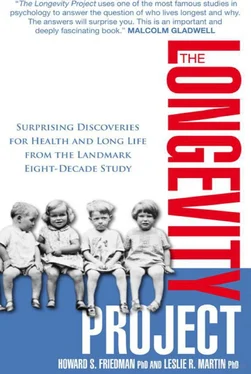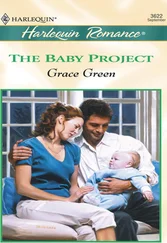Religious Involvement Throughout Life
In 1950 Donna and the other Terman participants (who were then around forty years old) were asked, “As an adult, to what extent are you religiously inclined?” Some were not at all religiously inclined, others were a little, and still others were moderately or strongly religious. Donna, for example, indicated that she was moderately religious. The question did not ask respondents if they were affiliated with a particular religion or regularly attended religious services. Instead this was a more global question, accounting for private practice of religion, too.
Unfortunately, a particular type of bias often crops up in studies of religion and health: people who report that they attend religious services on a regular basis may be healthier to start with—they have the ability to get out and about, they are not severely depressed, and they have enough social skills to be able to function in a community. We designed our studies to look at health effects that go beyond these obvious ones.
The cases of Linda and John and Donna showed us that religious involvement has many aspects that could be relevant to good health, but they also illustrated the differences among individuals in their religious devotion and their daily health habits. Linda was both the most traditional and the most religious of the three. She had a compassionate nature, being described in childhood as “kind on principle” and unable to tolerate cruelty. She was also prudent and truthful—“never misleads or misrepresents, however great the temptation.” She attended her Catholic church regularly throughout life, which reinforced these inclinations.
Linda’s early religious leanings were evident from her response to Dr. Terman’s early questions about reading. In 1922 he presented a list of twenty-eight different types of readings. The children were requested to place an X in front of those they liked and two X s in front of those they liked “very much.” Although Linda placed X s on twelve different lines, only three received double X s: love stories, garden books, and the Bible. Religious reading found its place in her top three again in 1927. In adulthood many of Linda’s health behaviors were consistent with what we know to be true of religious folks in general: she never smoked and she never drank alcohol. She remained an active member of her congregation, and so did her husband.
Although John and Linda shared some of the same childhood characteristics (he was described as “truthful, honest, and frank” as well as being more tender and sympathetic than the typical child), his lack of religious inclination was as clear as Linda’s predisposition toward it. As a child and young adult, he rarely attended religious services and while in 1922 he marked twenty-five of the twenty-eight types of reading as enjoyable, he did not put an X on the line next to the Bible.
Donna fell in between the two—she didn’t particularly care about reading the Bible, but as a teenager she listed religious reading as one of her preferred genres. Her church attendance during childhood was not as regular as Linda’s, but her religious involvement increased over time, peaked in midlife, and then clearly tapered off after her sons left home.
We then asked ourselves: Was religious involvement at midlife predictive of long life during the ensuing decades? Before we get to those results, take a moment to reflect on your own religious experience.
SELF-ASSESSMENT: RELIGIOSITY
Answer each of the questions below as accurately as you can—some of these are exactly the same questions Dr. Terman asked his participants decades ago.
Not at all 1 2 3 4 5 Very much
1. To what extent are you religiously inclined?
1 2 3 4 5
2. How much do you enjoy reading religious texts?
1 2 3 4 5
3. How regularly do you attend religious services?
1 2 3 4 5
4. How much do you pray?
1 2 3 4 5
5. How often do you watch religious programs on television or listen to them on the radio?
1 2 3 4 5
6. How involved are you with your religious community?
1 2 3 4 5
To calculate your score, simply add up your responses. Your result should fall between 6 and 30. Higher scores correspond with greater religiosity, but how should this be interpreted? It’s not what you might first think. Having a low score is no reason for health panic and a high score is no assurance of long life because, as we discovered, not all elements of religiosity are equally important. We need to separate out the elements of being “religious” in order to understand how religion is relevant to health.
When we looked at whether religious involvement at midlife was predictive of long life during the ensuing decades, we saw that religiosity did not matter much for the men, a finding that has also surfaced in shorter-term studies by other researchers. But for the women, the religiously inclined were clearly more likely to live long lives.
In childhood these women tended to be more prudent, generous, and unselfish than the typical child. When they were teenagers, their parents described them as especially full of tenderness and sympathy and as having affectionate relations with their families. They grew up happier but somewhat more likely to conform to the authority of others, and they were optimistic about the future. They were, of course, less likely to smoke, abuse alcohol, and take illegal drugs. Importantly, in addition to being religious, these women tended to be socially involved and outgoing.
Trajectories of the Religious Women Who Lived Long
For the individual, of course, religiosity and religious attendance are not static and unchanging. Some people are and stay devout, others drift away, and still others become more devoted and spiritual over time. To understand the story in a way that included the importance of changes in religiousness over time, we teamed up with Professor Michael McCullough. 78 78 Our study with Dr. McCullough is M. E. McCullough, H. S. Friedman, C. K. Enders, and L. R. Martin, “Does Devoutness Delay Death? Psychological Investment in Religion and Its Association with Longevity in the Terman Sample,” Journal of Personality and Social Psychology 97 (2009): 866-82. For more reading on Dr. McCullough’s work, see his book Beyond Revenge: The Evolution of the Forgiveness Instinct (San Francisco: Jossey-Bass, 2008).
Mike has a well-deserved reputation for his research on revenge, forgiveness, and other such fascinating aspects of religion and health. Our measures of how religious each Terman subject was came from various questions they answered throughout many years. In addition to queries about the extent to which they were religiously inclined, they reported on their religious instruction, their Bible reading, their worship, and more. In our research, their answers were judged on religiosity, ranging from absolutely no religious interest to having a very strong religious inclination and involvement, at various points in time.
We again analyzed who lived the longest, now looking more fully at their life paths across the decades. Could it be that the long-lived women achieved an inner peace and self-healing through their long-term prayer and devotion? Which of their characteristics mattered most to long life?
The very religious women tended to be very friendly but were also inclined to be worriers. We found that we could explain their long lives by taking into account their outgoing yet concerned personalities, and their good, helpful social ties and behaviors, as they were measured in midlife. In other words, for these women, religion was a core and stable part of who they were and how they behaved—and it served them well in terms of long life.
Читать дальше











